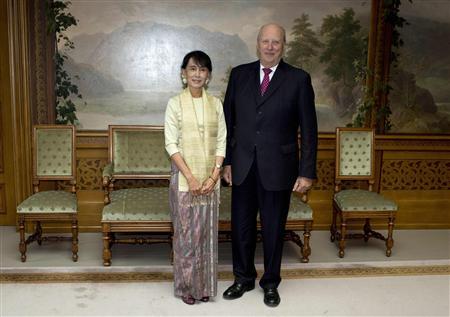
“What the Nobel Peace Prize did was to draw me once again into the world of other human beings outside the isolated area in which I lived, to restore a sense of reality to me,” Suu Kyi said as the packed crowd, led by Norway’s King Harald and Queen Sonja, rose in a standing ovation.
Suu Kyi, 66, the Oxford University-educated daughter of General Aung San, Myanmar’s assassinated independence hero, said much remained to be resolved in her country.
“Hostilities have not ceased in the far north; to the west, communal violence resulting in arson and murder were taking place just several days before I started out the journey that has brought me here today,” Suu Kyi said at the ornate Oslo City Hall, on her first visit to Europe in nearly 21 years.
“There still remain (political) prisoners in Burma. It is to be feared that because the best known detainees have been released, the remainder, the unknown ones, will be forgotten,” she said, wearing a purple traditional Burmese dress and looking strong and healthy after falling ill on Thursday.
Still, Suu Kyi – elected to parliament in April – said she was confident President Thein Sein wanted to put the country on a new path.
“I don’t think we should fear reversal,” she told public broadcaster NRK. “(But) I don’t think we should take it for granted there is no reversal.”
Suspending rather than lifting sanctions was also the right move to keep pressure on the government, she said a day after arriving from Switzerland to a jubilant, dancing and chanting crowd, which showered her with flowers.
“If these reforms prove to be a façade, then the rewards will be taken away.”
INSTRUMENTAL
Suu Kyi, who spent a total of 15 years under house arrest between 1989 and her release in late 2010, never left Myanmar even during brief periods of freedom after 1989, afraid the military would not let back in.
Her sons Kim and Alexander accepted the Nobel prize on her behalf in 1991, with her husband Michael Aris also attending the ceremony. A year later Suu Kyi said she would use the $1.3 million prize money to establish a health and education trust for Burmese people.
She was unable to be with Aris, an Oxford academic, when he was diagnosed with prostate cancer and died in Britain in 1999.
On Saturday, Kim and Anthony Aris, her late husband’s identical twin brother, attended the ceremony.
Suu Kyi thanked Norway, a nation of just 5 million people, for its support and the instrumental role it played in Myanmar’s transformation.
In 1990, the Bergen-based Rafto Foundation awarded its annual prize to Suu Kyi, after a Norwegian aid worker in South-East Asia highlighted her work.
The award provided lasting publicity for her non-violent struggle against Myanmar’s military junta, putting her in the international spotlight and setting the stage a year later for the Nobel Peace Prize.
Norway has also provided a home to the Democratic Voice of Burma, an opposition television and radio outlet, which broadcasts uncensored news into Myanmar.
Suu Kyi acknowledged that recent violence between Rakhine Buddhists and stateless Muslim Rohingyas in the northwestern Rakhine region was a test of Myanmar’s transformation but she blamed lawlessness for the escalation.
The violence, which displaced 30,000 people and killed 50 by government accounts, flared last month with a rampage of rock-hurling, arson and machete attacks, after the gang rape and murder of a Buddhist woman that was blamed on Muslims.
“The very first time a crime was committed… they should have taken action in accordance with the rule of law,” Suu Kyi told the BBC.
“If they had been able to do that, and to satisfy all parties involved that justice was done … I do not think these disturbances would have grown to such proportions.”
Tensions stem from an entrenched, long-standing distrust of around 800,000 Muslim Rohingyas, who are recognised by neither Myanmar nor neighbouring Bangladesh, and are largely considered illegal immigrants.
Suu Kyi is also due to visit Ireland, Britain and France.

